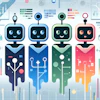What We Do
The U.S. Chamber of Commerce Foundation harnesses the power of business to create solutions for the good of America and the world. We anticipate, develop, and deploy solutions to challenges facing communities—today and tomorrow.
Our Issues
- DisastersWe help businesses and communities respond to, prepare for, and recover from disasters.Learn More
- WorkforceWe develop solutions to meet America’s workforce needs.Learn More
- CivicsWe strengthen American democracy.Learn More
Our Impact in Stories
- Education
Commerce Meets Classroom: The Business Case for a K-12 RevolutionIntroducing Commerce Meets Classroom, a new series from our K-12 education experts, Kyle Butler and Caitlin Codella Low, featuring the business perspective on pressing education issues.
By Kyle Butler
- Emerging Issues
Winning the Race for Quantum Supremacy
By Kelsey Margey
Our Solutions
- Resilience in a BoxBecome a more resilient business with these easy-to-use tools.Learn More
- Talent Pipeline ManagementLearn how to build successful talent pipelines to fill open jobs.Learn More
- The Civic Trust®A nonpartisan commitment to boost civic literacy, skills, and participation.Learn More
Upcoming Events
- Disasters13th Annual Building Resilience ConferenceWednesday, May 15 - Friday, May 1709:00 AM EDT - 05:00 PM EDTLearn More
- WorkforceEPIC Summer Meeting 2024Thursday, June 2009:30 AM EDT - 05:00 PM EDTLearn More
Partner Stories
Interested in receiving U.S. Chamber of Commerce Foundation updates?
The Connector is our monthly newsletter connecting you to innovative solutions, strategic partnerships, and our top stories.
Latest Content
Peer feedback is important, especially for our AI-powered colleagues. We had AI chatbots evaluate each other's responses to determine the capabilities and creative limits of the four most popular AI chatbots. By having the tools assess each other, we uncovered strengths, limits, and insights into their 'personalities,' biases, and self-awareness.
Meet Moon Nguyen and Melissa Mendizabal, the U.S. Chamber Foundation’s first Innovation Scholars.
Introducing Commerce Meets Classroom, a new series from our K-12 education experts, Kyle Butler and Caitlin Codella Low, featuring the business perspective on pressing education issues.
Elections are a cornerstone of our democracy, yet there are significant shortages of election poll workers that could prevent polling places from opening for upcoming elections in 24 states.
Learn more about the IBM Sustainability Accelerator, winner of the 2023 Citizens Award for Best Sustainability Program, from Vice President and Chief Impact Officer, Justina Nixon-Saintil.




















